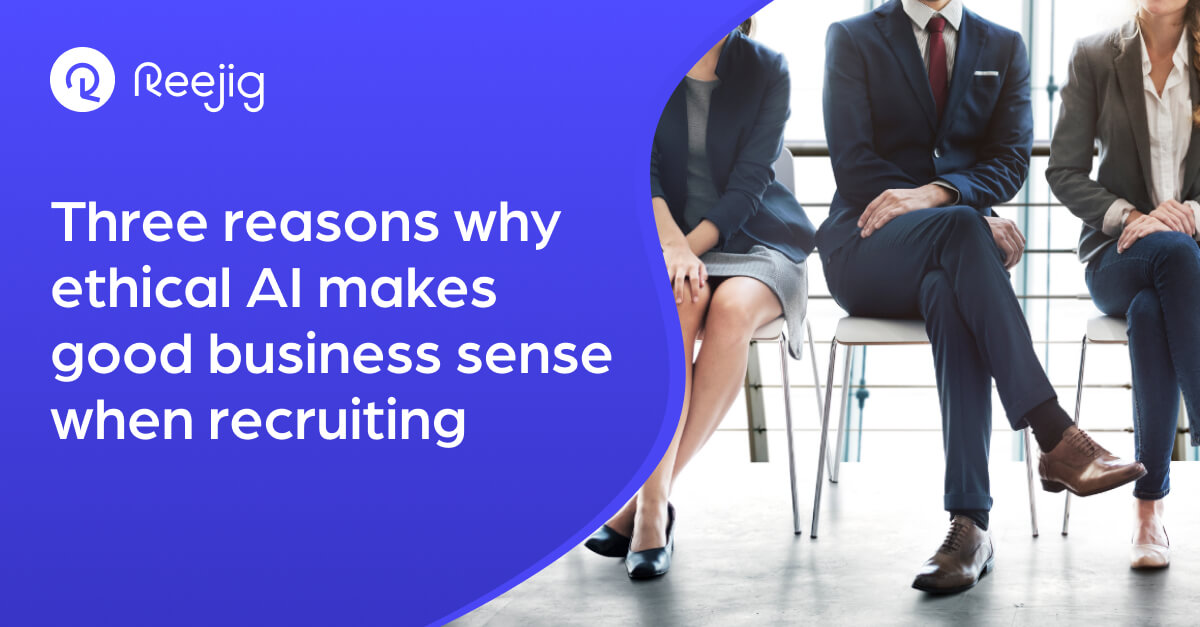Three reasons why Ethical AI makes good business sense when recruiting
Reejig
4 mins
Feb 6, 2022

Three reasons why Ethical AI makes good business sense when recruiting
Blog Post Body
Table of Contents
Talk to a Work Strategist
See the Work Operating System in action and start re-engineering work for AI.
Subscribe to our newsletter
The latest insights on re-engineering work for AI
Artificial intelligence is having a transformational impact on our daily lives. Investment in, and adoption of, these technologies is rapidly accelerating, with market researchers at IDC predicting that AI spend will more than double to $204 billion during the next four years.
Google CEO Sundar Pichai suggests that AI’s impact on society will be greater than fire or electricity. This potential underscores how high the stakes are and how critical it is to ensure that ethical considerations are baked in from the outset.
Conversations around the ethical nature of AI often lag behind its ‘wow’ factor, but they’re just as important in positioning the technology to empower and improve the lives of people everywhere.
Ethical AI is more than a philanthropic (or even philosophical) endeavor, and it has the potential to drive real benefits for your business.
"Ethical AI is not a nice to have. It delivers real benefits business."
Mike Reed, Chief Technology Officer & Co-Founder, Reejig
Applying an ethical AI framework to recruitment makes your teams, and your business, stronger, faster, and more secure.
3 ways that Ethical AI in recruitment can help future-proof your business
1. Building stronger and more diverse teams by removing bias
Bias — and especially unconscious bias — is everywhere. It permeates through every decision we make and can have a significant impact on the people we bring into our teams. With an ethical framework, AI can be used in a way that removes this unconscious bias from the process, so you can more objectively build diversity and strengthen your teams.
While AI models have been used in the past to spearhead recruitment drives, they’re often running on old company data and processes, which risk reinforcing previous biases. That means you build that ‘status quo’ back into your teams, recruiting or promoting people with exactly the same background, learnings, and skills, which removes diversity from your thinking.
That makes your teams weaker. It means you’re missing out on a wide range of perspectives, skills, and expertise, limiting your capacity to explore new and exciting avenues for growth. Teams with increased diversity have been shown to be more profitable, more innovative, and more successful. With an AI mechanism that’s based on fairness and equality, you have the power to build diverse teams and amplify your performance.
2. Maintaining privacy and security
AI is data-hungry. When you inject the personal data of candidates and employees, it can quickly become challenging to assess whether you’re acting ethically and within the expectations of your people.
It’s vital to understand whether the collection of data raises reputation or legal risks and how to mitigate them. Infusing your AI algorithms with a transparent and accountable framework provides more certainty over how data is being sourced, stored, used, and retained.
Executives should work closely with their privacy, risk and security teams, and recruitment partners to build or assess ethical frameworks – making sure that everyone is part of the conversation (including the individual) and that the approach has transparency front of mind.
This will maintain ethical standards and help keep you compliant as circumstances change.
3. Demonstrating leadership against competitors
Ethical AI is still an emerging field, with the World Economic Forum leading the way in helping organizations consider responsible use of the technology to reduce corporate risk. Its application within recruitment presents an enormous opportunity for organizations to become part of what will be a critical pillar of AI use.
By partnering with vendors that take AI ethics seriously, you’re staying one step ahead of competitors who put ethics on the backburner. This creates a sustainable and ethical way for your business to dramatically shorten and simplify recruitment processes in the long term.
It also means you’re getting access to the best diverse talent, much faster than your competitors, allowing you to build and discover skills that strengthen your workforce, and grow your business.
Kickstart your process of finding an Ethical Talent AI partner
- What are you looking to solve by implementing a Talent AI tool?
- Metrics are important – what is your highest priority?
- What specific goals do you want to achieve such as internal mobility, recruitment, diversity and/or learning?
- What is the current state of your data infrastructure?
- What systems do you already have implemented within your talent function?
- Are you looking to add to your tech stack, or replace it?
- Are the tools you are looking for able to integrate with current systems?
- What assurance do you have, or need, to have trust in the tech?
Talk to a Work Strategist
See the Work Operating System in action and start re-engineering work for AI.
Subscribe to our newsletter
The latest insights on re-engineering work for AI